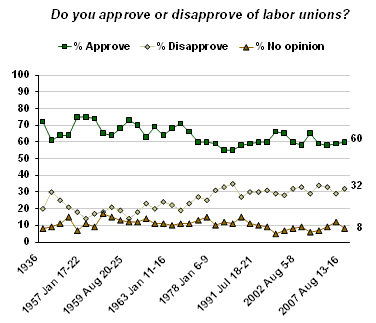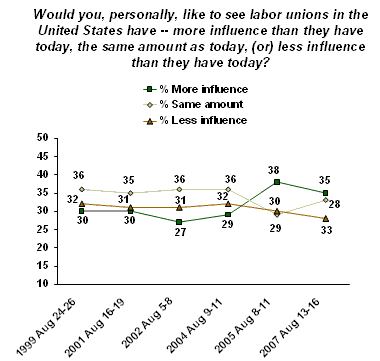"Gallup's annual Work and Education survey finds little change during the past several years in Americans' opinions about labor unions, with 60% of Americans now approving of unions. Less than one in five Americans say labor unions in this country will become stronger in the future, and only about one in three say they would like to see labor unions have more influence. The percentage of Americans who say they want unions to have more influence is on the high end of what Gallup has measured in the past eight years" (Joseph Carroll, "Sixty Percent of Americans Approve of Labor Unions," 31 August 2007). That sounds promising, doesn't it?
And yet, the Bureau of Labor Statistics' data show a radical decline of work stoppages, so much so that now little work time is lost to industrial conflict in the USA.
As workers have increasingly lost their ability for concerted industrial action, the share of national income going to their wages and salaries has clearly declined. On 29 March 2007, the Center on Budget and Policy Priorities reported: "the share of national income going to wages and salaries in 2006 was at its lowest level on record, with data going back to 1929. The share of national income captured by corporate profits, in contrast, was at its highest level on record" (Aviva Aron-Dine and Isaac Shapiro, "Share of National Income Going To Wages And Salaries At Record Low In 2006: Share of Income Going to Corporate Profits at Record High," 29 March 2007). See Appendix Table 3 of the CBPP report below.
And there is no sign of reversal. There was no work stoppage in July 2007, according to the BLS.
As share of the total estimated working time this year, the level of work stoppages is just about the same as zero.
Saturday, September 01, 2007
Subscribe to:
Post Comments (Atom)
















No comments:
Post a Comment